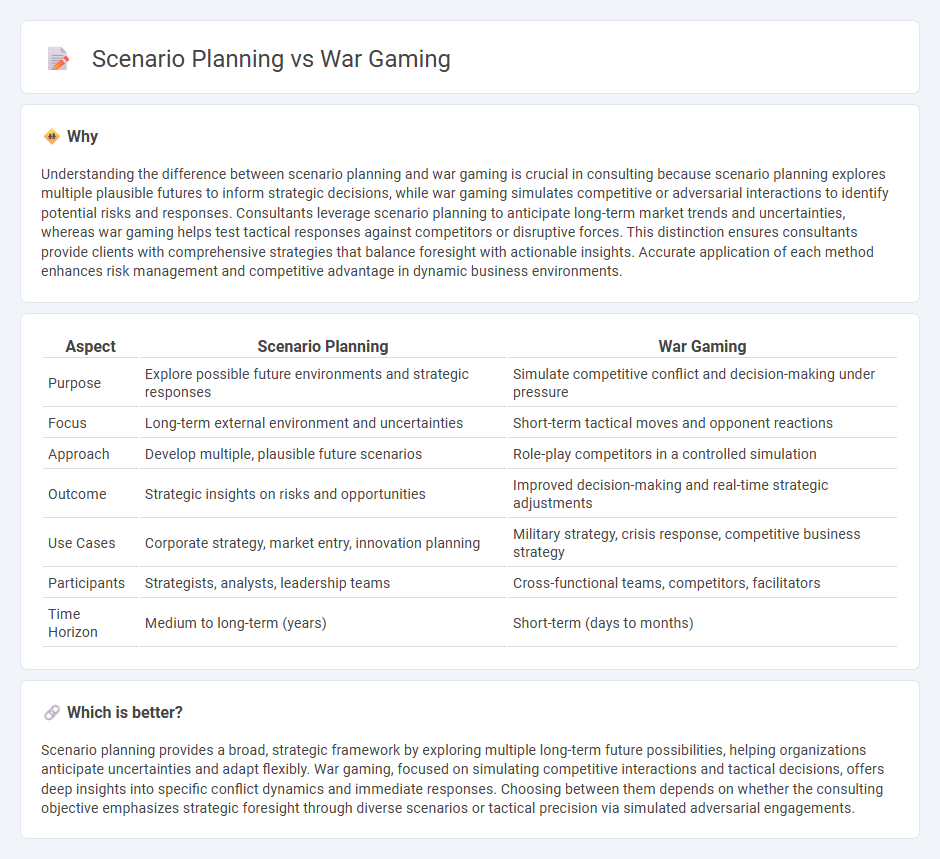
Scenario planning enables organizations to anticipate various future possibilities by creating detailed, plausible narratives about potential challenges and opportunities. War gaming involves simulating competitive or adversarial situations to test strategic decisions, improve readiness, and identify vulnerabilities. Explore the differences between scenario planning and war gaming to enhance your strategic consulting approach.
Why it is important
Understanding the difference between scenario planning and war gaming is crucial in consulting because scenario planning explores multiple plausible futures to inform strategic decisions, while war gaming simulates competitive or adversarial interactions to identify potential risks and responses. Consultants leverage scenario planning to anticipate long-term market trends and uncertainties, whereas war gaming helps test tactical responses against competitors or disruptive forces. This distinction ensures consultants provide clients with comprehensive strategies that balance foresight with actionable insights. Accurate application of each method enhances risk management and competitive advantage in dynamic business environments.
Comparison Table
| Aspect | Scenario Planning | War Gaming |
|---|---|---|
| Purpose | Explore possible future environments and strategic responses | Simulate competitive conflict and decision-making under pressure |
| Focus | Long-term external environment and uncertainties | Short-term tactical moves and opponent reactions |
| Approach | Develop multiple, plausible future scenarios | Role-play competitors in a controlled simulation |
| Outcome | Strategic insights on risks and opportunities | Improved decision-making and real-time strategic adjustments |
| Use Cases | Corporate strategy, market entry, innovation planning | Military strategy, crisis response, competitive business strategy |
| Participants | Strategists, analysts, leadership teams | Cross-functional teams, competitors, facilitators |
| Time Horizon | Medium to long-term (years) | Short-term (days to months) |
Which is better?
Scenario planning provides a broad, strategic framework by exploring multiple long-term future possibilities, helping organizations anticipate uncertainties and adapt flexibly. War gaming, focused on simulating competitive interactions and tactical decisions, offers deep insights into specific conflict dynamics and immediate responses. Choosing between them depends on whether the consulting objective emphasizes strategic foresight through diverse scenarios or tactical precision via simulated adversarial engagements.
Connection
Scenario planning and war gaming are interconnected strategic tools used in consulting to anticipate potential future challenges and opportunities. Scenario planning generates diverse, plausible future environments, while war gaming simulates competitive interactions within those scenarios to test strategies and decision-making. This combination enhances risk assessment and strategy formulation by providing dynamic insights into complex market conditions.
Key Terms
Competitive Simulation
War gaming emphasizes interactive, real-time simulations to model competitive scenarios and decision-making under uncertainty, often used by military and corporate strategists. Scenario planning involves developing diverse, plausible future narratives to inform strategic flexibility, but typically lacks the dynamic competition focus present in war gaming. Explore how competitive simulation through war gaming can enhance strategic foresight and operational readiness.
Strategic Foresight
War gaming involves simulated conflict exercises to test strategic decisions under competitive conditions, enhancing military or business readiness. Scenario planning explores multiple future possibilities to anticipate risks and opportunities, supporting long-term strategic foresight and flexible decision-making. Discover how combining war gaming with scenario planning strengthens your strategic foresight capabilities.
Decision-Making Uncertainty
War gaming simulates competitive environments using role-playing techniques to expose strategic risks and test decision-making under uncertainty. Scenario planning develops multiple plausible future contexts to identify potential opportunities and threats, enhancing long-term strategic flexibility. Explore our detailed analysis to understand how these methods improve organizational resilience amid uncertainty.
Source and External Links
Wargame - Wikipedia - Wargaming is a strategy game where players command opposing armed forces to simulate armed conflicts, used for recreation, military training, or studying conflicts across land, naval, air, and cyber domains, originating in 19th-century Prussia.
Wargaming | U.S. Naval War College - Wargaming at the U.S. Naval War College involves simulating complex war scenarios to build strategic, analytical, and decision-making skills in military leaders, supporting defense planning and education through diverse gaming events.
Wargaming (company) - Wikipedia - Wargaming Group Limited is a global video game company known for military-themed, free-to-play online action games such as World of Tanks and World of Warships, with headquarters in Cyprus and multiple studios worldwide.
 dowidth.com
dowidth.com